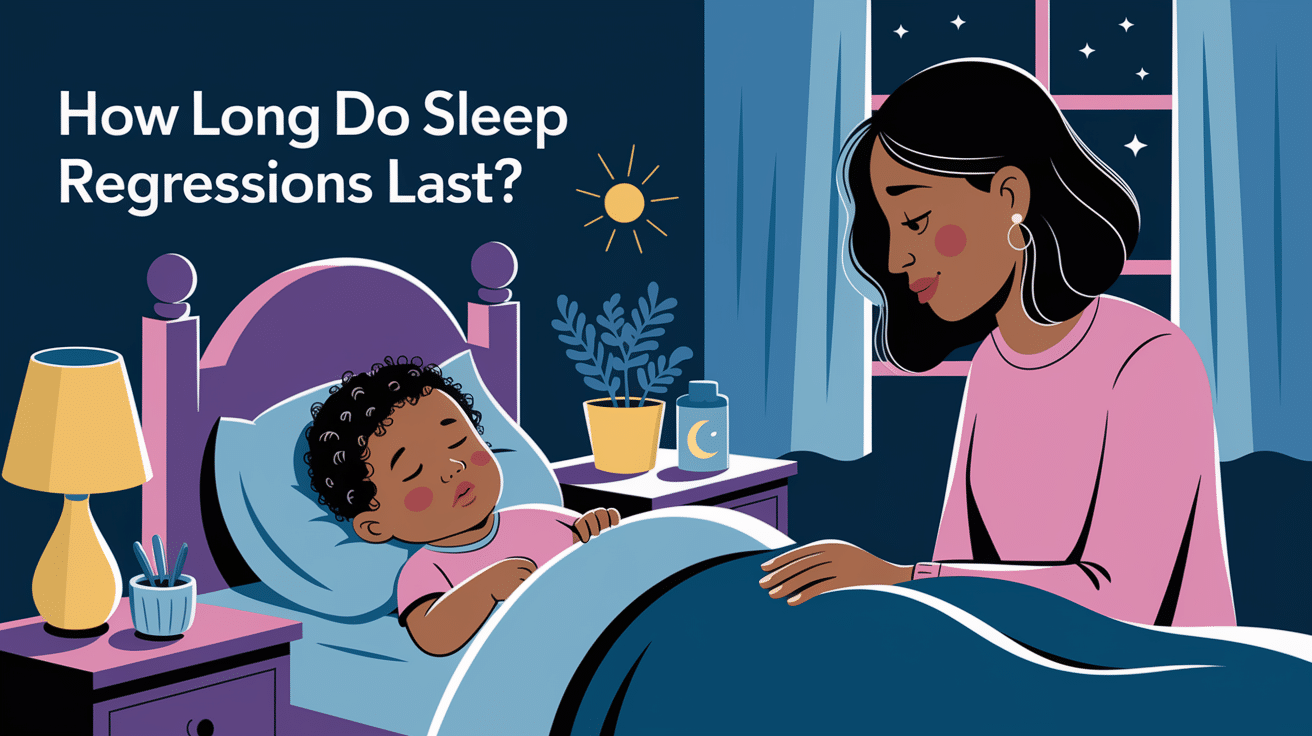
Sleep can become a big challenge for parents when babies undergo changes. Parents often wonder, “How long do sleep regressions last?” during those tough nights with a wide-awake baby.
Suddenly, good sleep habits disappear, and nights become unpredictable. Every sleepless moment feels like a test of patience. These sleep changes happen because babies are growing and learning new skills.
Their brains are busy developing, which can mess up sleep patterns. Although these phases might seem frustrating, they are normal parts of a child’s growth.
Here, you’ll find helpful insights and simple tips to get through these tricky sleep times.
What is a Sleep Regression?
Sleep regression is a period when a baby who was sleeping well suddenly starts having trouble with sleep. During these phases, your baby might wake up more often at night, fight naps, or take longer to fall asleep.
You might notice your baby becoming fussier than usual or experiencing more nighttime crying. These challenging sleep disruptions typically happen because your baby is going through important developmental changes.
As they learn new skills like rolling over, sitting up, crawling, or talking, their brains are working overtime, which can interfere with sleep. Other common triggers include teething pain, growth spurts, or changes in routine, like starting daycare or moving to a new home.
Sleep regressions are completely normal parts of your baby’s development, even though they can be exhausting for parents.
The good news is that most sleep regressions are temporary. They usually last two to six weeks before your baby returns to better sleep patterns.
Different Stages of Sleep Regressions

As babies grow, they experience several sleep regressions. Each sleep regression happens at a specific age and for different developmental reasons. These periods can be challenging, but they are normal parts of your child’s growth.
Understanding what happens during each regression can help you better support your baby. Most sleep regressions last a few weeks before your child returns to normal sleep patterns.
Each stage brings unique challenges but also means your baby is developing new skills.
| AGE | COMMON CAUSES | SYMPTOMS | TIPS FOR PARENTS |
|---|---|---|---|
| 4 Months | Sleep cycle maturation, increased awareness, new motor skills (e.g., rolling) | Frequent night-waking, short naps, fussiness | Maintain consistent routines, offer extra comfort, and understand that it’s a developmental milestone |
| 8–10 Months | Crawling, standing, separation anxiety, nap transition | Night-waking, crying for parents, sleep resistance | Practice skills during the day, stick to nap schedules, offer reassurance |
| 12 Months | Walking, talking, teething (molars), dropping second nap | Bedtime resistance, night-wakings, overtiredness | Stay consistent with routines, manage teething pain, adjust nap schedule if needed |
| 18 Months | Language burst, increased independence, resurfaced separation anxiety | Refusing bedtime, nap strikes, fear of dark, night crying | Be patient but firm, use calming bedtime rituals, and set clear boundaries |
| 2 Years | Imagination development, nightmares, crib-to-bed transition, potty training | Bedtime fears, stalling, early wakings, leaving bed | Keep bedtime calm and consistent, respond to fears without reinforcing them, stay firm with expectations |
How Long Do Sleep Regressions Last?

Sleep regressions typically last between two to six weeks, though this can vary widely depending on the child and circumstances.
Every child is different, and factors like age, temperament, and home environment play a significant role in how long a sleep regression might persist.
Consistent bedtime routines, calm parenting approaches, and maintaining a stable sleep environment can help shorten the duration of these challenging periods.
It’s important to distinguish between a temporary sleep regression and a more persistent sleep issue.
Most regressions are normal developmental phases during which children experience changes in sleep patterns due to growth, learning new skills, or emotional development.
If sleep disruptions continue beyond two months or significantly impact the child’s daily functioning, consulting a pediatrician can provide personalized guidance and rule out any underlying concerns.
What to Expect During a Sleep Regression?

During a sleep regression, parents may notice significant changes in their child’s behavior and sleep patterns. Your baby might become more clingy, irritable, or resistant to bedtime routines.
Sleeping through the night can become challenging, with more frequent wake-ups, shorter naps, or difficulty falling asleep. These changes often coincide with major developmental milestones like learning to crawl, walk, or talk.
Children may experience increased separation anxiety, causing them to wake up more often and seek comfort from their parents.
Some kids become more active at night, playing or talking instead of sleeping. Appetite changes, increased fussiness, and heightened emotional sensitivity are also common.
While these disruptions can be exhausting for parents, they are typically a normal part of a child’s growth and development, signaling important cognitive and physical progress.
Tips for Managing Sleep Regressions

Sleep regressions can be challenging for both parents and children. Every family experiences these difficult periods differently. The key is to stay calm and patient during this temporary phase.
Consistent routines can help provide comfort and stability for your child. Remember that this is a normal part of childhood development. Your approach can make a significant difference in managing sleep challenges.
- Stick to a Consistent Bedtime Routine: Create and maintain a predictable sequence of events before bedtime.
- Use Gradual Sleep Training Methods: Implement gentle techniques like the “check and console” approach.
- Create a Calm Sleep Environment: Ensure the bedroom is dark, quiet, and at a comfortable temperature.
- Practice Self-Care for Parents: Take turns with your partner and get support when possible.
- Keep Daytime Routines Stable: Maintain consistent nap times and daily schedules.
- Be Patient and Flexible: Understand that this is a temporary phase of development.
- Monitor Your Child’s Overall Well-Being: Watch for any signs of underlying issues beyond normal regression.
Final Words
Understanding how long sleep regressions last is crucial for parents facing these challenging times. Remember, most sleep regressions typically last two to six weeks and are completely normal.
Every child is different, and patience is key. While these periods can feel endless, they are temporary developmental phases that signal your child’s growth and learning.
Stay consistent with routines, offer comfort, and take care of yourself during these times.
If sleep disruptions persist beyond two months or significantly impact your child’s daily life, consulting a pediatrician can provide personalized guidance. Trust that this phase will pass, and better sleep is just around the corner.
If you’re interested in more informational content on mothers and babies, feel free to click here and explore other blogs that you might enjoy.

